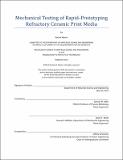| dc.contributor.advisor | Samuel M. Allen and James F. Bredt. | en_US |
| dc.contributor.author | Martin, Rachel (Rachel M.) | en_US |
| dc.contributor.other | Massachusetts Institute of Technology. Department of Materials Science and Engineering. | en_US |
| dc.date.accessioned | 2014-04-25T15:48:33Z | |
| dc.date.available | 2014-04-25T15:48:33Z | |
| dc.date.copyright | 2012 | en_US |
| dc.date.issued | 2013 | en_US |
| dc.identifier.uri | http://hdl.handle.net/1721.1/86278 | |
| dc.description | Thesis: S.B., Massachusetts Institute of Technology, Department of Materials Science and Engineering, February 2013. | en_US |
| dc.description | Page 30 blank. Cataloged from PDF version of thesis. | en_US |
| dc.description | Includes bibliographical references. | en_US |
| dc.description.abstract | Additively manufactured (3D-printed) refractory alumina-silica ceramics were mechanically tested to ascertain their ultimate tensile strengths and observed to determine their dimensional consistency over the printing and post-printing process. The equipment used to perform tensile testing was designed and built for use with custom-designed tensile test samples. Two ceramic powders, V18 (electronic-grade alumina, colloidal silica, and organic content) and 403C (200-mesh mullite, organic content, and magnesium oxide), were printed into test samples on ZCorporation ZPrinter® 310 and 510 machines, before being infiltrated with tetraethylorthosilicate (TEaS), and in some cases infiltrated again with a 40% by weight suspension of silica in water (Ludox). Ludox-infiltrated V18 proved to be the strongest medium, with a UTS of 4.539 ± 1.008 MPa; non-Ludox-infiltrated V18 had a UTS of 2.071 ± 0.443 MPA; Ludox-infiltrated 403C was weakest with a UTS of 1.378 ± 0.526 MPa. Within V18, greater silica content lead to greater tensile strength, but this did not hold true for 403C. 403C displayed volumetric shrinkage of about 1.5%, while V18's volumetric shrinkage ranged from 7% to 14%. | en_US |
| dc.description.statementofresponsibility | by Rachel Martin. | en_US |
| dc.format.extent | 31 pages | en_US |
| dc.language.iso | eng | en_US |
| dc.publisher | Massachusetts Institute of Technology | en_US |
| dc.rights | M.I.T. theses are protected by copyright. They may be viewed from this source for any purpose, but reproduction or distribution in any format is prohibited without written permission. See provided URL for inquiries about permission. | en_US |
| dc.rights.uri | http://dspace.mit.edu/handle/1721.1/7582 | en_US |
| dc.subject | Materials Science and Engineering. | en_US |
| dc.title | Mechanical testing of rapid-prototyping refractory ceramic print media | en_US |
| dc.type | Thesis | en_US |
| dc.description.degree | S.B. | en_US |
| dc.contributor.department | Massachusetts Institute of Technology. Department of Materials Science and Engineering | |
| dc.identifier.oclc | 874659927 | en_US |
